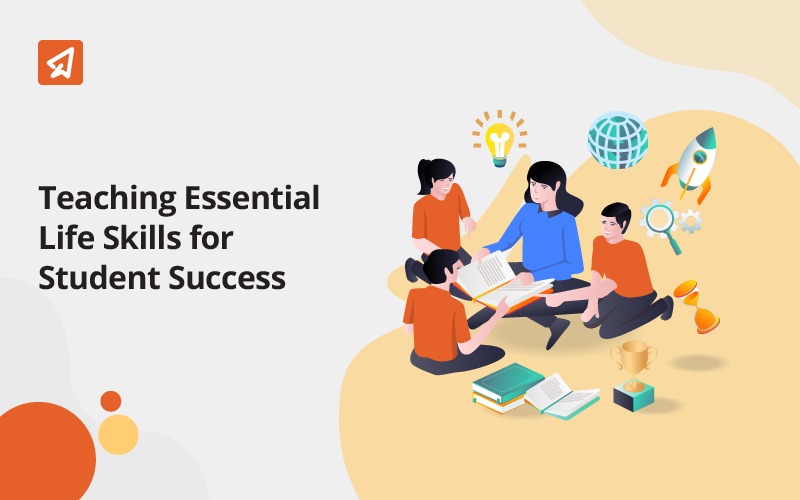How Teaching Life Skills Can Empower Students for Success

Being future-ready is the new cool! As a teacher, it is not only essential to help students master academic content but also acquire the right abilities to build a successful career in the future. One aspect of these abilities include global professional skills like critical thinking, problem-solving, effective communication, time management, emotional intelligence, adaptability, leadership and so on. Another key aspect of preparing students for a successful future is equipping them with life skills.
Life skills are a diverse set of abilities that extend beyond the boundaries of traditional learning. These skills empower students to navigate the complexities of the modern world by developing awareness and making informed choices. For example, teaching students about the role of money without actually discussing the importance of saving, budgeting or investments is likely to be of little to no use when they grow up.
In this blog, we take a look at why life skills should be an integral part of student learning and the different approaches in which teachers can integrate these key skills into classroom teaching.
Important Life Skills That Every Student Should Know About
A significant driving force that enables students to attain success in the future is their ability to make informed life choices. While great communication, problem-solving, emotional intelligence, etc. are all crucial skills for building a successful personal and professional life, there are some foundational life skills that every student should know about. These abilities will enable them to make informed decisions, build confidence, develop strong relationships and ensure a well-rounded, resilient future.
Here are three key life skills that every student should know about:
1. Financial Literacy: Learning about the concept of budgeting, saving, investing, managing debt, etc. will enable students to make informed decisions when it comes to money by using their resources wisely, establishing the right financial goals, thereby achieving financial stability.
2. Health & Wellness: Self-care and stress management are two major elements of health that students should know how to navigate. Understanding the importance of nutrition, regular exercise, pursuing hobbies and taking care of mental health is key to maintaining overall well-being.
3. Digital Literacy: Understanding how to use modern digital tools safely is crucial in today’s tech-powered age. Students should know about basic cyber rules, beware of cyberattacks and explore the latest tech tools in a safe and secure way.
How Learning Life Skills Prepares Students for the Real World

Cultivating life skills is pivotal, as they are the building blocks of personal growth, confidence and self-reliance that empower students to thrive in an evolving global landscape. In recent years, there’s been constant pressure on students to outperform themselves and excel academically, without getting a real understanding of concepts. This is why it is not only important for teachers to impart knowledge in the classroom but also develop thinking and analysis based on action. It will help them think creatively and adapt to new scenarios in the real world. Here’s where life skills play a major role.
Let’s understand this further by exploring a few ways in which life skills help students prepare for future success:
1. Personal Development
Life skills empower students to become independent and self-reliant individuals. By honing skills like time management, goal setting and organization, students learn how to effectively manage their lives. These abilities get carried onto adulthood, enabling them to navigate personal and professional challenges more efficiently. Students equipped with life skills have a greater sense of self-assurance and confidence, which makes it easier for them to adapt to new situations, pursue their passions, and establish meaningful relationships.
2. Career Readiness
The current job market is extremely competitive, where employers prioritize hiring candidates with strong critical thinking and interpersonal skills. By integrating life skills into the curriculum, educators prepare students for their future careers. Effective communication, teamwork and adaptability are all critical skills that employers seek. When students have a solid foundation in these areas, they are more equipped to contribute as valued employees.
3. Emotional Intelligence
Emotional intelligence is a key aspect that shapes an individual’s personal and professional life. Incorporating Social Emotional Learning (SEL) at school level enables students to understand and manage their own emotions while also developing empathy and effective communication with others. These skills improve their social interactions, conflict resolution, and overall well-being.
Practical Ways to Integrate Life Skills into Classroom Teaching
To thrive in today’s 21st century landscape, skills like strong communication, problem-solving, critical thinking, resilience, leadership and proactivity are essential. But as an educator, it may not always be clear how to effectively teach these. Here are four practical approaches to help educators teach and inculcate key life skills in students:
1. Experiential Learning
Incorporating real-life scenarios in the curriculum helps students apply theoretical concepts to practical situations. For instance, teachers can conduct budgeting exercises to teach financial literacy, allowing students to manage imaginary finances and make decisions about spending, saving, and investing. This will help instill critical thinking and decision-making skills in students, while making learning engaging and relevant.
2. Role-Play & Simulations
Engaging students in role-playing activities will allow them to practice and apply life skills in a safe and controlled environment. This can involve scenarios related to teamwork, conflict resolution, decision-making, or effective communication. By providing opportunities for hands-on activities, students can develop and refine their life skills.
Teachers can use integrated platforms like Extramarks Smart Class Plus to access powerful tech-enabled learning tools such as digital whiteboards, animated lessons, interactive simulations and game-based modules to drive extra engagement, foster creativity and boost student learning outcomes in the classroom.
3. Group Projects & Collaborative Learning
Encourage students to work together on assignments and collaborate on projects. This will help them learn how to manage conflicts, allocate tasks, and achieve shared goals. Teachers can do this by structuring group activities that require students to rely on one another’s strengths and contributions, fostering a sense of responsibility and cooperation. By working in teams, students also learn to respect diverse perspectives, negotiate and value the importance of cooperation.
4. Problem-Based Learning
Learning through real-world examples and challenges can be a great way for students to develop their skills. Teachers can present students with complex concepts related to their curriculum and guide them through the process of research, evaluation, analysis and coming up with solutions. This process will not only give them an in-depth understanding of the topic but also hone their critical thinking and problem-solving skills.
The journey of empowering young learners to be confident, self-aware professionals who are well-equipped with key life skills can often be a challenging path for teachers to navigate. With a little help from comprehensive platforms such as the Extramarks Teaching App, this journey can be made transformative and fulfilling.
The Teaching App is a 360-degree teaching solution designed to make conducting and managing online classes seamless using powerful digital tools. With the option to conduct live classes, record lectures, add lecture notes, chat with students to resolve doubts, get AI-backed reports and more, teachers can make classroom learning a lot more engaging and demonstrate the importance of key life skills.
To conclude, life skills are not just supplementary but are the very foundation on which students build successful, fulfilling lives. Teachers carry the responsibility of equipping young minds with the tools to navigate a rapidly changing society, make informed choices and foster strong relationships. Ultimately, the importance of teaching life skills lies in shaping well-rounded individuals who are capable of thriving both academically and in the real world.
Last Updated on April 16, 2025
Reviewed by

Prachi Singh | VP - Academics
Prachi Singh is a highly accomplished educationist with over 16 years of experience in the EdTech industry. Currently, she plays a pivotal role at Extramarks, leading content strategy and curriculum development initiatives that shape the future of education...read more.










